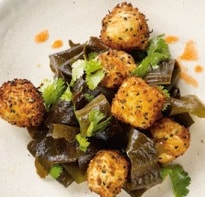The secret to enjoying seaweed is just getting the dressing right and taking the plunge
Some foods don't fare at all well in blind tastings. Anyone unfamiliar with the delights of
Stinking Bishop cheese,
Korean kimchi (fermented, pickled vegetables) or
Swedish surströmming (fermented herring) may well think they've stumbled into a locker room full of old socks and other, er, "aromatics". If the first bite is with the eye and the second with the nose, some people will never take that third, actual bite if the food in question smells too fishy, fermented or cheesy.Take seaweed: it smells and tastes just a bit too much like, well, weeds you find in the sea. As with all British seaside experiences, however, the secret to enjoyment is simply getting the dressing right and taking the plunge. I draw on various cultures for inspiration, but it is to Japanese cuisine that I most often turn to adorn and, yes, mitigate that distinctive flavour and texture.Seaweed has a deep umami flavour,
that mysterious, savoury fifth taste, thanks in large part to it being a natural source of MSG, which helps spread a deep, saline, addictive flavour throughout a dish.Nearly all edible seaweeds - or "sea vegetables", as they ought technically to be called - belong to one of three broad groups: green, red and brown algae. Sea lettuce and aonori are the most widely used of the green group - sea lettuce in salads and soups, aonori in powdered form. Red algae, meanwhile, tend to have a deeper, sulphur-like aroma. Nori, the most common of these, is the traditional sushi wrapper, while dulse - a purplish leaf that turns green when cooked - develops a distinct aroma of bacon when fried; it also contains the sugar galactose, used in the gelling agents
agar-agar and
carrageenan. The generally milder brown algae include in their number kelp, kombu (essential in dashi) and wakame, the vibrant green leaves in miso soup and salads.
Fresh seaweed is always the best bet, but you're unlikely to find that in a town centre. Luckily, the dried stuff is easier to obtain, from healthfood and specialist Japanese shops, and online. Rehydration methods and cooking times aren't standard across brands, so play around until you find what suits you. That may sound a little intimidating but, like swimming in the sea, one rarely regrets eating seaweed, because it's so good for you.
Seaweed and watermelon salad
An extraordinary combination of sweet and savoury that makes the most refreshing supper starter on a warm summer's night. Serves four.
25g dried wakame seaweed25g dried sea spaghetti seaweed½ small watermelon, peeled and cut into 0.5cm-thick wedges1 tsp sesame seeds (white, black or a mixture of both)For the dressing
2 tsp honey1 tsp rice-wine vinegar2½ tbsp mirin1 tsp Dijon mustard2 tsp soy sauce2 tbsp tahini paste2 tbsp groundnut oilRinse the wakame and sea spaghetti separately, and put each in a separate small saucepan. Cover both with cold water, bring to a boil, turn down to a simmer and cook for 10 minutes, until al dente (the sea spaghetti may take a minute or two longer). Drain, pat dry, cut the wakame into 2-3cm slices and set aside.Put all the ingredients for the dressing in a bowl and whisk until well combined.To serve, lay three slightly overlapping wedges of watermelon on each plate. Put some sea spaghetti and wakame on top, making sure the watermelon underneath is still visible, and pour over the dressing. Sprinkle with sesame seeds and serve at once.
Crusted tofu with wakame and lime
You can leave the seaweed out of this altogether, if you prefer, and just fry up the tofu with the coriander crust. Served with the dressing as a dipping sauce, or even just drizzled with a little fresh lime juice, it's good enough to stand on its own as snack or pre-dinner canapé. Serves four.
45g dried wakame seaweed40g panko breadcrumbsGrated zest of 2 small limes2½ tsp coriander seeds1 tbsp black (or white) sesame seeds15g coriander leaves250g firm tofu, cut into 2cm chunks35g plain flour1 egg, lightly beatenAbout 100ml sunflower oil, for fryingSaltFor the dressing
1 tbsp lime juice1 tsp sesame oil1 tsp sriracha chilli sauce2 tsp rice-wine vinegar2 tbsp groundnut oilRinse the wakame in plenty of cold water, then transfer to a saucepan, cover with fresh cold water and bring to a boil. Turn down the heat to a simmer and cook for about 10 minutes, until al dente. Drain, pat dry and set aside.Next, make the dressing. Whisk together the lime juice, sesame oil, sriracha, vinegar and an eighth of a teaspoon of salt. Slowly pour in the groundnut oil bit by bit, whisking as you do so, until fully combined and emulsified. Set aside.
Lightly crush the coriander seeds, then put them in a bowl with the panko breadcrumbs, lime zest and sesame seeds. Add half a teaspoon of salt and mix well. Toss the tofu first in the flour, then in the egg and finally in the breadcrumb mixture, making sure it's well coated all over.Heat the oil in a medium frying pan over a medium-high heat. Once the oil is hot, add half the breaded tofu and fry it for four to five minutes, turning so it goes golden-brown and crisp all over. Remove with a slotted spoon, transfer to a kitchen paper-covered plate and keep warm while you cook the remaining tofu (you may find you need to add a little more oil to the pan).Cut the wakame into 2-3cm slices and put these in a large bowl with the coriander leaves. Pour over the dressing and stir. Divide between the plates, top with the fried tofu and serve at once..• Yotam Ottolenghi is chef/patron of
Ottolenghi and
Nopi in London.
Yotam Ottolenghi's crusted tofu with wakame and lime: 'Good enough to stand on its own as a pre-dinner canapé.' Photograph: Colin Campbell for the Guardian